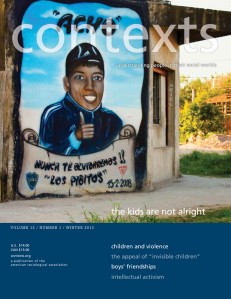
Winter 2013
Volume: 12 | Number: 1
Measuring Same-Sex Relationships
The last decade has seen dramatic changes in how U.S. society views and recognizes same-sex couples. U.S. Census Bureau employees, Nancy Bates and Theresa J. DeMaio, chronicle recent efforts taken by the Census Bureau to update and improve the measurement and counting of same-sex couples. Read More
What They’re Watching
A "list" of what six social scientists are watching on television and film. Read More
Is Marriage for Anyone?
Two recent books on marriage—Is Marriage for White People? by Ralph Richard Banks and Unhitched by Judith Stacey—are considered in this review essay by sociologist Micki McGee. Banks argues that the decline of marriage among African American women constitutes a social problem that could be remedied if more women from this group opted for interracial marriages. Stacey's cross-cultural study contends that marriage is an institution that attempts the near impossible task of reconciling the goals of domesticity with those of erotic life, and that in the process an extraordinary range of marital arrangements have emerged. Taken together these arguments ask us to consider who marriage serves. Read More
Body Lessons
Sociologist Janet Enke explores the challenges of teaching a course on the body. She discusses how to synthesize the subjective experience of the body with academic theory, and convey knowledge about the politics of the body. Read More
Ye of Little Faith
Despite the proclamations of Republican senators, there are more secular Americans now then ever before; sociologist Phil Zuckerman argues that their growth warrants greater attention to secularity on the part of social science. Read More
The Hearts of Boys
Five experts, Niobe Way, C.J. Pascoe, Mark McCormack, Amy Schalet, and Freeden Ouer shed light on the everyday lives of teenage boys and their relationships. Read More
The White Girl’s Burden
Sociologist Amy C. Finnegan provides a critical analysis of the movement behind the Kony 2012 campaign and how this unique form of activism coalesces with the biographies of the activists, who are notably white, privileged, Christian, adolescent females. Read More
The Maquiladora Syndrome
Sociologist Gloria González-López offers her reflections about one of the most important lessons she learned about conducting sociological research inspired in feminism and intellectual activism in a Mexico-USA-Mexico transnational context. Read More
Missing Romance
Sociologist Minjeong Kim asks why Asian American characters in the U.S. television shows and films are always in interracial relationships, and explores the implications of the absence of Asian American couplings on screen. Read More
Beyond “Post 9/11”
Sociologist Erik Love reviews the books Islamophobia and the Politics of Empire and Terrifying Muslims. Each move beyond “post 9/11” explanations for anti-Muslim sentiment, showing how Islamophobia is best understood not as a temporary backlash, but rather as stemming from longstanding and durable forms of racial bigotry and colonialism. Read More
